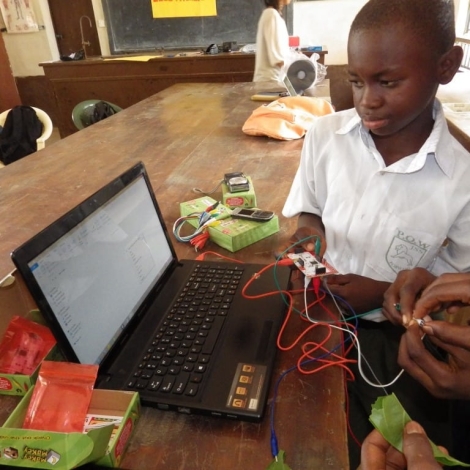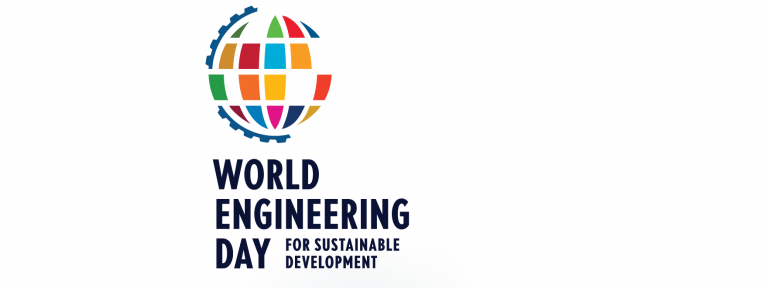In collaboration with Heather Cole-Lewis and Ariam Mogos
Special to E4C
Today, at Prince of Wales secondary school in Freetown, Sierra Leone, dozens of students are running around in a 12 by 25ft (3.5 to 7.5m) space scribbling on erasable dry paint. They are pulling apart whole computers, hacking circuits, making films and constructing paper mache prototypes of what they imagine the future of Sierra Leone to be. This DIY, free-for-all space, is not what you would typically find in a formal learning environment. Particularly not in developing countries. But Mr. Bundor, the principal of the school, thought it was a good idea to enable students as makers and learners. The students are proving him right.
In 2013, our youth-education non-profit Global Minimum Inc. partnered with the Clinton Global Initiative to create four Innovation Labs. The labs are safe spaces for youth to explore their interests through tinkering, designing and prototyping projects using various tools at their disposal.
The potential for maker education spaces to equip youth with new life-long learning pathways is indisputable. And online resources such as these tips at Edutopia.com make it easy for teachers to integrate maker culture into the classroom.
Project-based learning and skill development combined with empowered design might just be the formula for youth makers to change the world.
But civic engagement has rarely been identified as one of the pillars of maker education. Youth projects in GMin’s Innovation Labs are rooted in learning through making and solving problems that students can identify with. This sets the Prince of Wales Lab apart from the ever-increasing establishment of maker education spaces around the world.
At Prince of Wales secondary school, electronics (Arduino, Makey Makey), film, metals, wood and paint are all part of the suite of tools students use to identify and solve the problems they find relevant within their communities and across their nation. These issues can include energy, water, sanitation, gender equality and others. Mentors and staff within the lab support students’ pursuits with community-building exercises and civic design challenges.

Photo courtesy of Ariam Mogos
Is it necessary to educate the youth about civic responsibility? Absolutely, and incorporating it into the maker education space through workshops and other activities provides youth with an additional layer of purpose and motivation, atop exploring their passions and interests. Project-based learning, related to community issues, allows the youth to strengthen other skills like leadership, collaboration and negotiation with a more applicable and fluid approach. These skills are essential for any kind of innovation and entrepreneurship.
We expect that the long-term impact of the innovation lab on the youth and the greater community will range from changes in self-efficacy to a higher interest in STEM (Science, Technology, Engineering and Math) and STEM careers to working prototypes and novel inventions, which can make an impact within their communities and potentially scale beyond them.
Maker culture and mere exposure to innovation has re-engaged youth in STEM and formal education, and it has positively made learning fun. This new generation of global citizens have a fresh perspective on learning, enhanced STEM literacies and last but hopefully not least, the responsibility and desire to transform their communities and the lives of those around them. Project-based learning and skill development combined with empowered design might just be the formula for youth makers to change the world.
Heather Cole-Lewis, PhD, MPH, is a behavioral epidemiologist with training in biomedical informatics, and specializes in using consumer-centered technology, such as mobile phones, to leverage behavior change and health outcomes. Heather, a proud Sierra Leonean-American, is a board member of NGO Global Minimum, Inc. where she contributes to the organization’s efforts to support global youth changemakers.
Ariam Mogos currently heads New Initiatives and Research at Global Minimum Inc. and is an associate with civic engagement and innovation firm Facilitating Change. Prior to that, she worked at the American Museum of Natural History in the Education department, where she supported youth programming and the implementation of mobile and web based technologies for informal learning.
Related resources
Ten best sites for free online education
Where to find engineering, programming, science, design, math, business and even arts courses to enhance your career.
Gallery: World Maker Faire’s DIY With a Difference
Farm hacks, kite cameras and emergency shelters: These homespun inventions can change lives.
Lessons in well drilling spill into the classroom
Lesson plans for middle-school students draw inspiration from real development projects that Engineers Without Borders carry out around the world. Lessons spin off from EWB video documentaries about clean water for Kenyans, alternative fuel for the St. Regis Mohawk Tribe in upstate New York, and bridge construction in Nicaragua. Teachers show a 15-minute documentary of the EWB project, then anchor their lessons in the cultural and scientific issues it encompasses.

